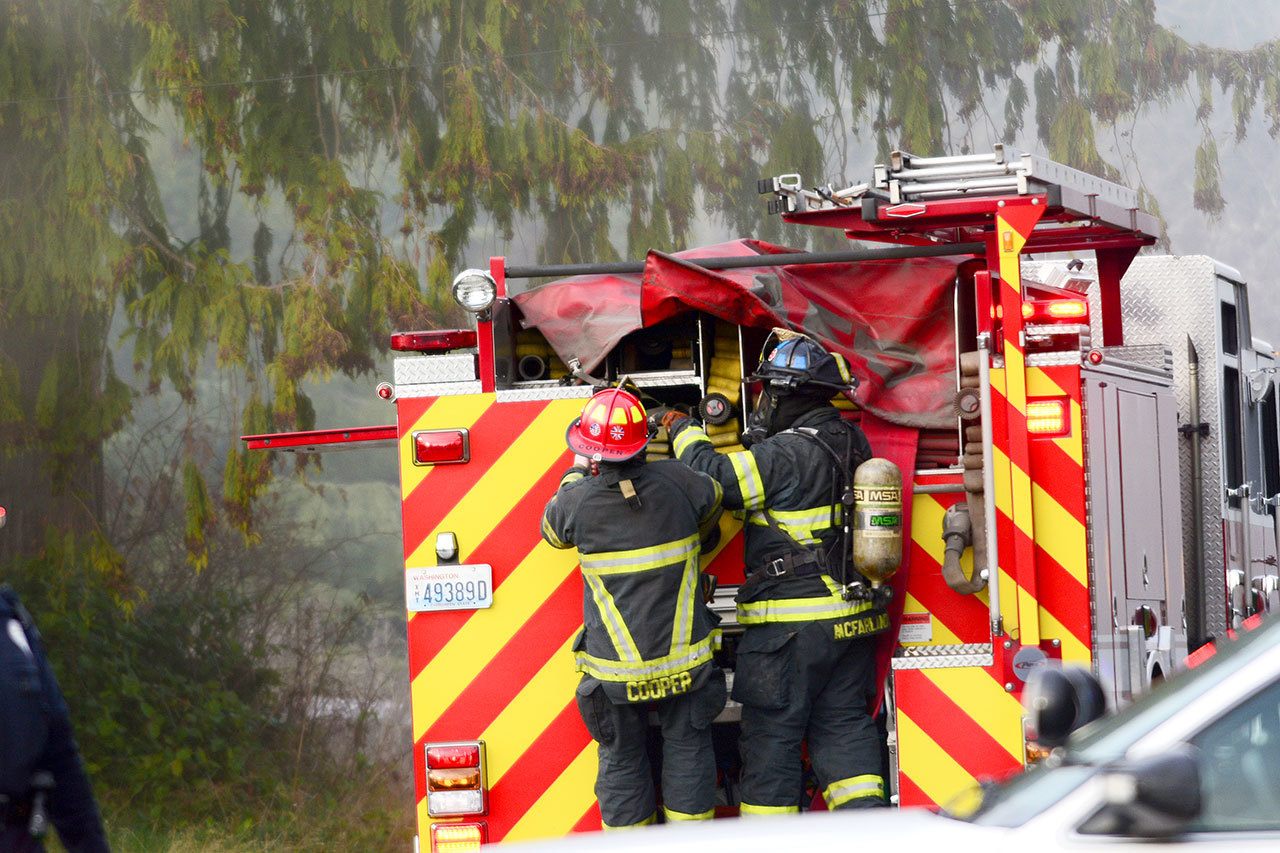PORT ANGELES — The Port Angeles Fire Department is so overworked and understaffed that the city is risking a downgrade in its fire insurance rating, according to Chief Ken Dubuc.
A downgrade could mean up to 90 percent of residents and businesses in Port Angeles would see anywhere from a 5 percent to a 10 percent increase in insurance costs, Dubuc said.
Because a Washington Surveying and Rating Bureau inspection in late 2015 determined the city’s fire insurance rating should be downgraded from 4 to 5, PAFD has been working to ensure that doesn’t happen, the fire chief said.
The rating system is on a scale from 1 to 10 and Dubuc said 4 is a good rating for the city.
To prevent the downgrade, the fire department agreed to make seven changes by Jan. 1, 2017. The most difficult of the changes: Always have at least five firefighters working at any given time, Dubuc said.
“The reality is we’re so incredibly busy that we need help,” he said.
The other six changes are:
• Increasing initial attack fire pumping capacity by 1,500 gallons per minute.
• Certifying department personnel as fire inspectors.
• Instituting a fire protections system inspection verification program.
• Reaching an agreement for after-hours refueling.
• Reaching an agreement for a reserve ladder truck.
• Adding a chief officer to the department.
The seven-part plan was developed in the early part of this year and presented to the City Council during a work session in May, Dubuc said.
“They understood exactly what we were dealing with,” he said.
During 2015, the fire department had an average of 4.5 people working daily while handling 4,464 calls throughout the year.
That number of calls has increased to 4,629 already this year and Dubuc expects about 150 more by the end of the year.
The fire department hasn’t seen a staffing increase in 25 years, although call volume has increased 241 percent during the same time period, he said.
“I can’t say enough about the personnel we have here,” Dubuc said. “They give and give and give and we continue to ask more of them.
“I don’t know how many times I can continue to go to that well. At some point I need to provide some relief.”
If an inter-local agreement for a ladder truck and a memorandum of understanding approving mandatory overtime are both approved during tonight’s City Council meeting, the PAFD will have completed the seven required changes.
However, the department will have only temporarily met the staffing requirement.
Starting Jan. 1, there will be mandatory overtime for firefighters as the department looks to hire at least two more more by July.
How many the fire department will actually need hasn’t yet been determined, Dubuc said.
The fire department has three grueling 24-hour shifts with little rest for firefighters. Shifts work every other day for five days before getting four days off. Then repeat.
Shifts average 12 or 13 calls per day, though it’s not uncommon to see 18 or 19 calls during a shift, Dubuc said.
“You can guarantee at any point in time during the day, you have a 50-50 shot we’re already on a call,” Dubuc said. “It’s not sustainable.”
To help remedy the problem by July, PAFD’s union agreed to drop the starting wage for new firefighters and paramedics by about 10 percent to $56,000.
But PAFD still needs to find funding to support the new positions, Dubuc said.
“Anything we would be asking for would certainly be less than the increase going to the insurance companies,” he said.
If the city’s rating is downgraded, those additional insurance fees residents would pay would go to insurance companies and not provide any additional services for the city.
“We know in order to meet the needs of the community we’re going to have to go to the community and get help,” Dubuc said. “We’re in a very difficult position right now.”
He expects the city to look at raising the Medic 1 fee residents and businesses pay on their utility bill to help with the funding.
Dubuc is also optimistic about a law the state passed in 2015 that would provide federal money to help reimburse costs associated with transporting Medicaid patients via ambulance.
Medicaid currently pays pennies on the dollar per transport and the city absorbs the rest of the cost, he said.
That funding should begin in 2018, he said.
“I know we’re going to be able to keep [the rating] at least through July,” he said. “The question is between now and July are we able to develop the revenue we need?”
________
Reporter Jesse Major can be reached at 360-452-2345, ext. 56250, or at jmajor@peninsuladailynews.com.

